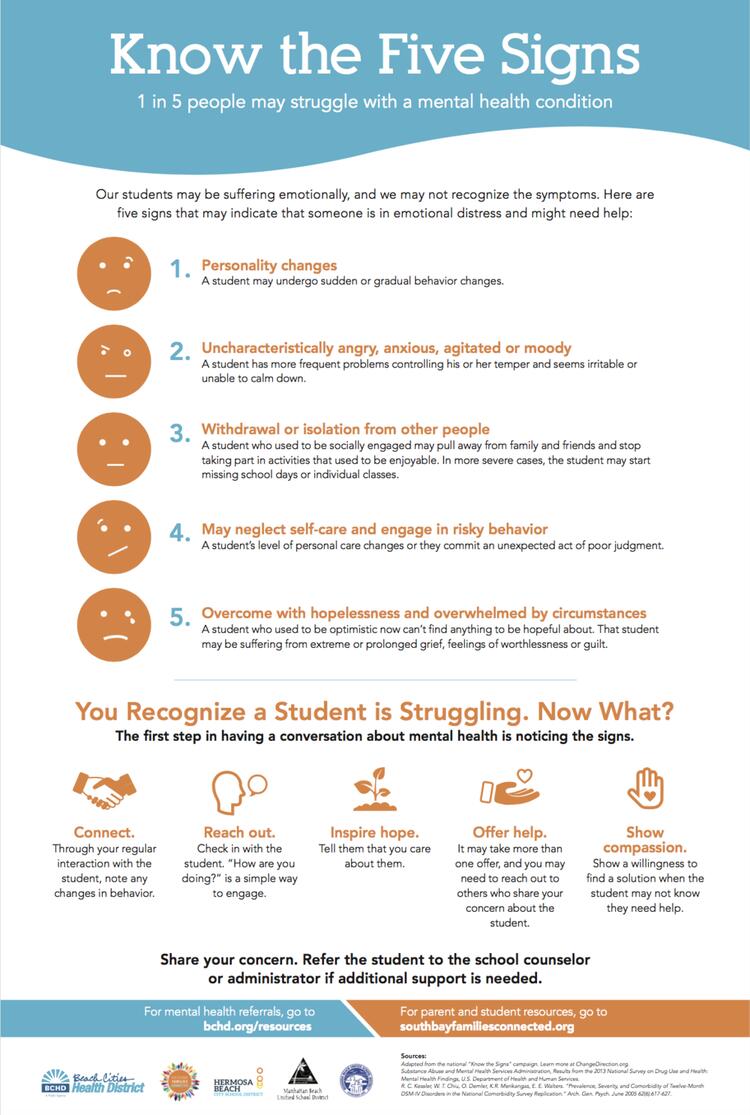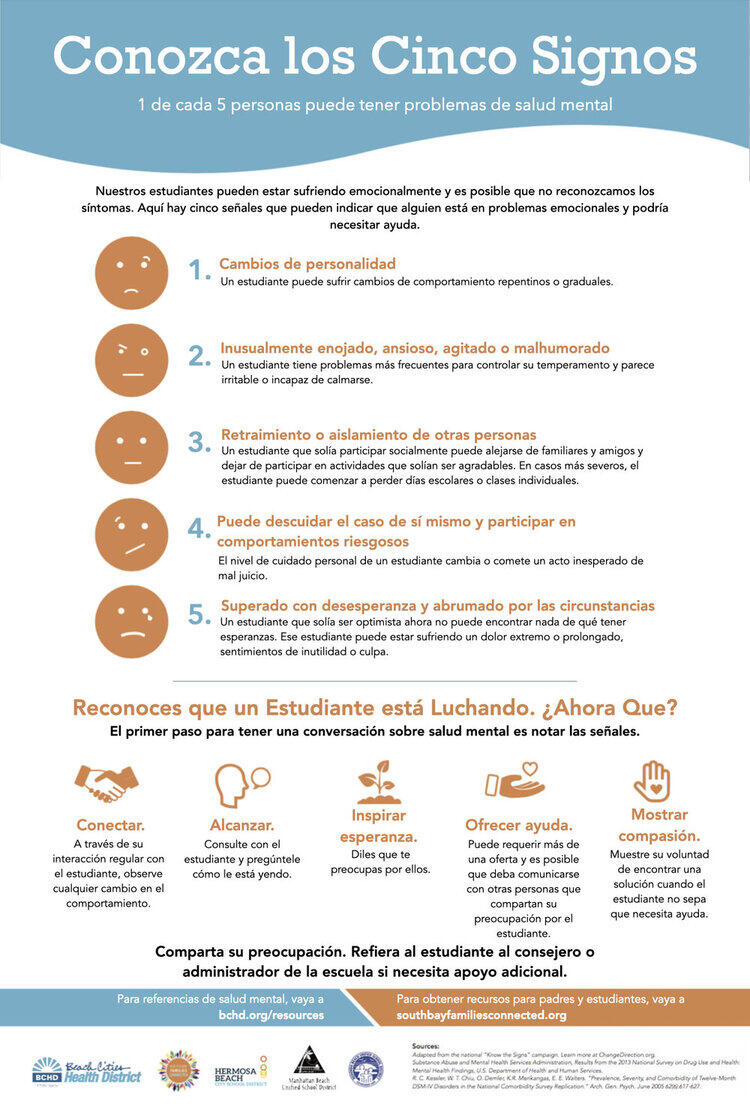Wellness Week FAQ Page For Families
This is a list of important questions we've gotten all in one place. Do you have a question that isn't featured here? Please email it to our Communications Department so we can add it and check back for updates. Thank you!
What You Need to Know:
In addition to the statistics below, many of our Board and staff personally know families that have been seriously affected by mental health struggles, but it’s not something we often feel comfortable sharing.
- 1 in 3 (30.6%) young adults between the ages of 18 and 25 experienced a mental, behavioral, or emotional health issue in the past year (SAMHSA, 2021).
- 36.7% of high school students reported feelings of sadness or hopelessness in the past year. This percentage is higher for females (46.6%), Hispanic students (40.0%), and lesbian, gay or bisexual students (66.3%) (CDC, 2020).
- Suicide is the second-leading cause of death for teens and young adults, ages 10-34 (CDC, 2022).
- 25.5% of adults ages 18-24 reported having seriously considered suicide in the past month. This is a higher percentage than any other adult age group (CDC, 2020).
Source: https://jedfoundation.org/mental-health-and-suicide-statistics/
Torrance Unified has TONS of resources to help students, but the tough thing is that due to stigma and other obstacles, so many students and families are still not aware of them!
- Every high school has a Wellness Center and Therapists available to speak with students. Some Wellness Centers have drop-in hours during late start or lunch times. Our middle schools also have therapists and our elementary schools have counselors available.
- We have a district-wide Virtual Wellness Center with great online resources for students and families.
- Some of our high schools have wellness clubs, and North High School has an ASB position for health and wellness.
- Our elementary students have access to Social and Emotional learning through our Second Step lessons.
- Our students have reminders on the back of their ID Cards for helplines they can text or call for assistance.
- Our entire district has a partnership with the SaySomething Anonymous Tipline that students can use to report a serious mental health concern for either themselves or another student.
Wellness Week is a nationally recognized week focused on wellness during National Mental Health Month. (May) This will be Torrance Unified 4th Annual Wellness Week that we are observing May 12-16. Each day has a specific theme, and district wide activities that you can join.
Helping Yourself or Others:
Sometimes it can be hard to know when to bring in extra support or professional help. Sometimes families believe that they should be able to solve issues within the family and keep things a secret. Here are some easy signs from our partners at South Bay Families Connected:
There are lots of fantastic guides to help you prepare for talking to your student about tough issues such as mental health, like this guide.
Answer coming soon!
All Torrance Unfied staff members are encouraged to access our Employee Health and Wellness webpage within the Human Resources Department on our Staff Internal Portal.
When You’re Ready to Ask for Help:
One of our favorite resources, The JED Foundation, answers this question here.
It is important to note that there may be waiting lists or delays in accessing services due to higher demand.
- If it is for your student, have your students start seeing the therapist at school (Middle and high school) or a counselor for elementary. Many families aren’t aware that our schools have available therapists/counselors, and the student can see them several times while they are waiting for an appointment with a longer-term, external therapist.
- Call your insurance. Ask your insurance which therapists are available in your network and which have open availability. You might just get an online list, and then you will have to call around to find out who is accepting new patients.
- Contact Care Solace. Care Solace is a free resource that our Torrance Unified District pays for. After filling out a confidential online questionnaire, a service rep will call you and ask similar questions, and then over the next few days, they will do a search and contact therapists on your behalf to see if they take your insurance and have openings and then they will text or call you with the answer depending on your preferences.
- If you have MediCal or don’t have insurance: You can ask your student's counselor to fill out a Building Bridges counseling referral. Our team will then connect your child with a TUSD partner who will follow up you to sepak with you and assign a therapist that your child can see either outside of school at a clinic, via telehealth, or at school. You can also email Building Bridges directly for a Building Bridges counseling referral.
- Consider Support Groups such as Alateen. These anonymous groups use the proven 12 step process and are often available at all times and days. Your student can speak to other students going through the same things
Great question! It can be confusing. Counselors are a great resource to start with. They can talk with students about stress, grades, graduation requirements, plans for after high school and more. They can then refer students to one of the more specialized counseling team members:
- School Counselors meet with students in elementary, middle, and high school to provide academic, guidance, and social-emotional support. Every elementary school and middle school has one counselor who leads the Second Step social-emotional curriculum and may have a counseling or mental health intern working with them on campus to provide services to students. Each High School has several Counselors that are organized to serve a portion of the alphabet and provide mainly academic and social-emotional guidance, and make referrals to related resources as needed.
- College and Career Counselors are a resource for students with questions on college applications, financial aid, scholarships, and career and major exploration.
- School Psychologists works with administrators and teachers, mainly in Special Education, to foster the best possible learning environment for students based on their individualized special needs. They identify students with assessments for behavioral problems, developmental differences, and other learning roadblocks that may cause academic difficulties. Most schools do not have a full time school Psychologist. If you have a child with special needs it is best to reach out to their teacher. Or, if you think your child may need assessment, it is best to start with your child's School Counselor.
-
School Therapists are professionals who have received specific training to help treat mental health issues and can see students individually or in groups to help with issues like depression, anxiety, self-harm, suicidal thoughts, addiction, and more. We have contracted school therapists from an outside mental health nonprofit agency to work full-time at each high school and middle school.
When You’re Frustrated with the Process:
After COVID, there was a significant rise in the number of people who need to speak with someone about mental health. Unfortunately, there is a shortage of available mental health professionals especially those serving youth. You often have to get creative, be open to tele-health appointments with therapists from other areas and be very persistent to advocate for yourself or your child. It’s important to keep at it!
Take any appointment that is available, as the time will pass and then your student will have an “in” on a consistent basis going forward. Then you can use some of these ideas while you wait:
- Get put on a waitlist for a cancellation, keep calling and checking as well. You may be able to get in sooner.
- Consider Teen Line for students to text with as they are waiting for their appointment and the link to the South Bay Families Connected Virtual Teen Center to explore.
- Consider Support Groups such as Alateen. These anonymous groups use the proven 12 step process and are often available at all times and days. Students can speak to other students going through the same things.
- Remind them that they aren’t alone, and you love them. If they talk to you about the issues, listen compassionately without discounting, reacting negatively or trying to solve their problems.
In some cases, your behavioral health/ mental health benefits might be through a secondary group and not your main insurance. For example, some Blue Cross subgroups outsource their mental health benefits to companies like “Behavioral Health.” It’s important to know that, because in that case you have to call the mental health company to find the doctors you can use, not the Blue Cross doctors.
This site provides information using PDF, visit this link to download the Adobe Acrobat Reader DC software.


